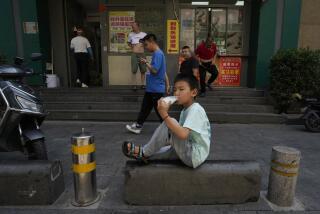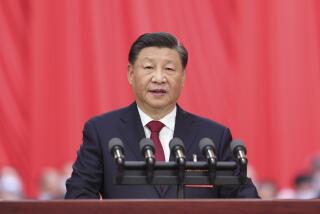Repression in China Called Economic Blow
- Share via
WASHINGTON — The Chinese government’s repression of the pro-democracy movement aggravated already severe economic problems that now seem certain to spread social unrest among China’s workers and peasant farmers, who make up the bulk of the population, the CIA predicted in a report issued Tuesday.
“The preoccupation of China’s leaders with consolidating power, restoring ideological orthodoxy and maintaining social order (following the crackdown on the democracy movement) will probably prevent them from formulating new solutions to the country’s economic problems,” the CIA said. “Consequently, China’s reform program is likely to be bogged down for the next few years.”
Even before the June 3-4 massacre in Beijing, China was facing the worst inflation since the Communists seized control in 1949, a growing unemployment rate and a troublesome balance-of-payments deficit, the report to a subcommittee of the congressional Joint Economic Committee said.
The report predicted that the Chinese leadership would seek to regain popular support by easing an austerity program instituted last year to combat an inflation rate of 19% a year that reached as high as 30% in the cities.
“Competing pressures to increase spending will probably prevent the retrenchment program from bringing inflation under control,” the CIA said. “In urban areas, inflation will probably remain above 20% through the end of 1990; nationwide, inflation is also likely to remain in double digits for at least the next 18 months.”
The report predicted that the persistent inflation will fuel urban unrest by eroding the living standards of many Chinese workers.
“Beijing may also worry that peasants might become restive because they are being pressed to grow more grain but are having increasing difficulty obtaining inputs and payment from a financially strapped government,” the CIA added.
If the unrest spreads to workers and peasants, it would create far more severe problems for the leadership than the pro-democracy movement, which was concentrated among students and intellectuals.
Sen. Jeff Bingaman (D-N.M.), chairman of the Joint Economic Committee’s subcommittee on national security economics, said the report indicates China’s reform efforts were too timid from the start and now have been stopped in their tracks.
“The clock is running backwards for the Chinese economy,” Bingaman said. “A decade of economic reform may have effectively come to a standstill with the crackdown in Tian An Men Square. . . . An unfortunate lesson for Westerners is that economic reform in socialist countries is not irreversible.”
The CIA said the central government’s preoccupation with social and political issues will lead to a sort of unplanned and unintended decentralization of economic decision-making. The result, the report said, could be even greater problems for the leaders in coping with the crisis.
“Local governments will probably strongly resist implementing austerity measures in their own areas--for example, by resuming some of the construction projects that central authorities canceled early this year,” the report said. “This resistance will be especially strong in wealthy southern provinces, where reform and an open door to Western business have yielded significant economic benefits.”
The CIA also said that China may be forced to drastically expand credit to foreign-funded business ventures to overcome the chill in investment and trade prompted by the violent crackdown.
“In speeches since the crackdown, (paramount leader) Deng Xiaoping has reiterated his commitment to pursue economic reform,” the report said. “The main elements of Beijing’s market-oriented reform program, however, have been stalled for almost a year. Such key reforms as price decontrol and bankruptcy are likely to be postponed indefinitely because Beijing does not want to add to its problems by implementing measures that would raise prices and swell the ranks of the urban unemployed. . . .”
It added, “Without further reform, however, China will be unable to alleviate the imbalances in its economy.”
More to Read
Sign up for Essential California
The most important California stories and recommendations in your inbox every morning.
You may occasionally receive promotional content from the Los Angeles Times.










